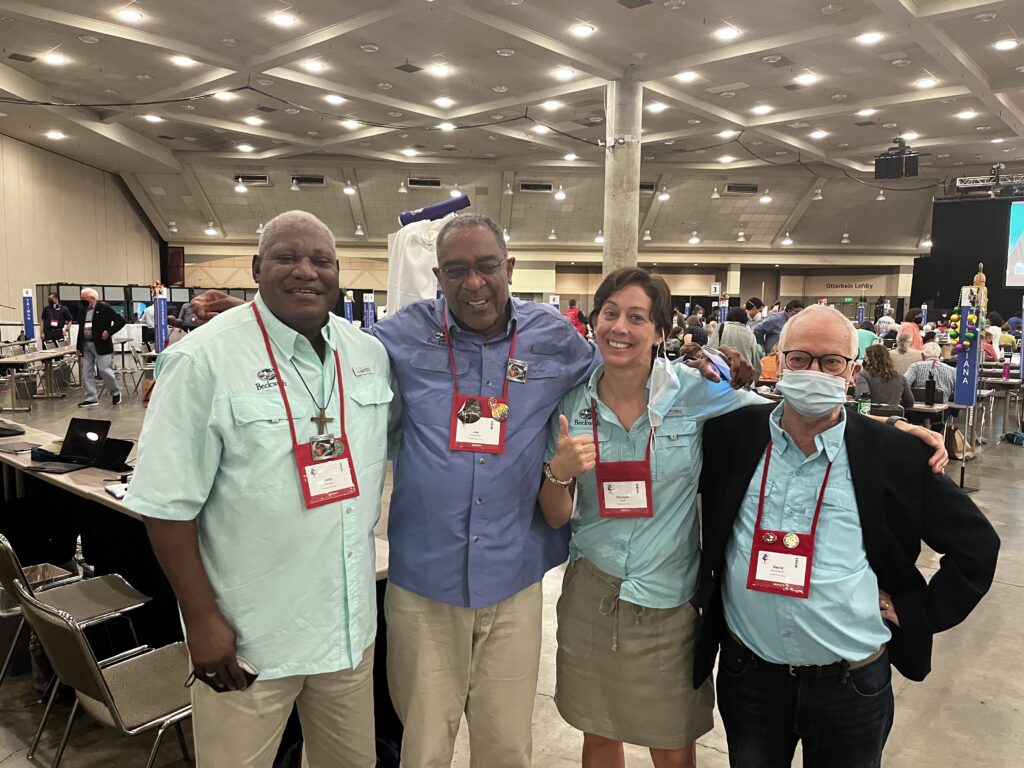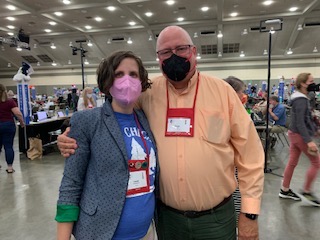
The legislative process at GC can sometimes drive me batty. Time is limited for debate and those wishing to speak queue up at microphones using an electronic queuing system for fairness. Most speakers are well prepared, knowing they only have 2 minutes (and asked often to slow down in order to allow the translators appropriate time). Also often we hear basically the same thing said by multiple people and when that occurs where there is no one speaking to the opposite side, I tend to get impatient as the will of the house is pretty obvious. But in reality, deputies speaking from their heart or from their experience regarding a resolution and its possible impact are at the core of why we are here. It’s a process (a lot of process in the process) and the diversity of deputies here is delightful to see. I am also very impressed by the number of younger deputies this convention and their willingness to speak to the issues in front of us. So I will resist yelling ”get off my lawn”, and see what I can learn from all the variety of people and opinions.
In her brief remarks after being elected President of the House of Deputies, Julia Alaya Harris said it was a victory for ”church geeks” everywhere. YES! She was speaking to the House but also to a large number of people watching online. She described herself as a church geek who loves the legislative process, canons, prayer book, and other things that make our church in some ways unique, and she also wanted to lift up her fellow church geeks and honor their passion for all things church. Thanks Julia! We look forward to your leadership.
The most moving moment yesterday was the approval, unanimously, of the merger of the Diocese of North Texas (formally called the Diocese of Ft Worth) with the Diocese of Texas, from whence it had been carved out decades ago. The Episcopalians of this diocese have been through incredible trials and tribulations, finally ending up with the vast majority of clergy and churches leaving the Episcopal church to align with another entity. Deputy Kate Sherrod, who has been so steadfast in her fight for her diocese, her church and her people, spoke to the importance of this day for her and so many others. Recently the Texas Supreme Court, in a decision that goes against almost 100% of all other court cases across the country when churches have voted to leave the Episcopal church but learned they could not keep their buildings or money, decided the break away diocese could not only have ALL the stuff, down to prayer books and vestments, they also could retain the name of the Diocese of Ft. Worth. Katie was in tears as she testified to the heartbreak and hardship, along with the delight in their reunion with the Diocese of Texas. Her haunting words were prophetic to me, saying ”the cost of inclusion is a heavy one”. The resolution passed with a standing ovation as the deputies from North Texas and Texas stood on the platform. To quote Presiding Bishop Curry from his sermon on Friday, this is one way we make ”plenty of good room for all God’s children.”
The evening session included two LONG debates, one on a resolution accepting the recommendation of a study group reorganizing how our archives are managed. It’s way too much to get into on here, but who knew so many people would speak passionately on this topic? I voted to support the 4 years of work of the study group. The other resolution which took a lot of time (and will have to be finished with this morning) had to do with resolution A048, which was offered by the legislative committee I serve on. Based on recommendations of a Task Force formed at the last GC, the resolution proposes much needed changes to how the budget for the church is developed, while keeping the authority for approving the budget with the GC. The budget process is currently very convoluted and recognizing this, the Task Force was formed to come up with a better approach. They have done so and I support their work. Our own deputy, David Quittmeyer was part of that process as a member of the Program, Budget, and Finance standing committee and David also supports what the task force has offered.
On a personal note, I was moved to tears as the PHOD awarded the Presidential Medal to Louisa McKellaston. Louisa is a young adult who works for the Diocese of Chicago and is chair of my committee. In addition, Louisa and her amazing family lived across the hall from the Knights our first year at Seabury Western seminary. She was a young teen then and made fast friends with my two daughters who were adjusting to this move and needed a friend. I am so proud of her! She has suffered through the tragic loss of both her parents since the last GC, her mother was my classmate and an amazing person and priest who died very unexpectedly and far too young. Her brother, Ian, is a star with the Chicago Symphony, their whole family being musically gifted. So proud of you, Louisa!
Time for the morning session soon. More to come. Two days to go! Thanks for reading, if you made it this far!
